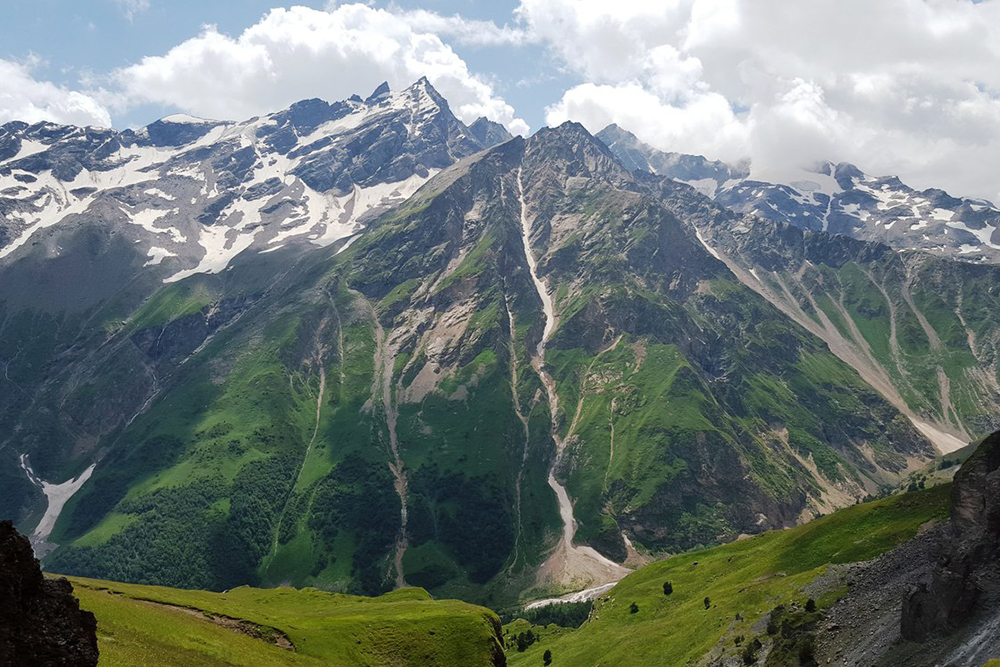An Excursion to the Sky

Elbrus. Photo from vk.com/club39153981
In July, students from the HSE Extreme Sports Club planted the university’s flag at the top of Mount Elbrus, one of the world’s highest peaks. Garry Rutberg, one of the club’s leaders, and Alexandra Oleinikova, an HSE alumna and the club’s guide, tell us about the complicated nature of the mountain, ways of fighting hypoxia, and what it’s like to walk amongst the clouds.
Life, Mountains, and Love
Garry Rutberg: Our HSE Tour Club has existed at the university for 16 years as part of the Extreme Sports division, and the club is devoted to pedestrian, mountain, and water tourism. It has around 14 teams that are different by skill level and tourism type. We try to make the climb to the top of Elbrus for everyone, but this is one of the most difficult mountains and truly tests your endurance.
We've climbed Elbrus three times. The first was in honour of HSE's 20th anniversary. It's always about testing yourself and showing your love for the mountains and fresh air. Overall, there's something for everyone. I've been on Elbrus four times. It's like a disease – after your first time in the mountains, you want to go back again and again.
In the history of the HSE Tour Club, we have already celebrated 18 weddings. This is because, despite the extreme nature of what we do, everyone gets really close while participating on our projects. These are natural emotions that people feel together and want to share afterwards as well. A lot has happened in the Club; people overcome obstacles without being able to explain how. Everything depends on a person’s motivation.
Which Approach to Take
Alexandra Oleinikova: Elbrus is a difficult endeavour for many reasons. Everest, for example, is much easier to climb because its weather conditions are more predictable. At 6,000 meters above sea level, people live quietly and raise livestock. As concerns climbing difficulty, Elbrus is equivalent to the 7,000-meter mountains. People typically climb Elbrus from the South, but the North is the more difficult and interesting side. It’s for advanced climbers, but we took beginners up this time. The mountain has two peaks – a western one and an eastern one. We went to the West. This was the coolest event of the year for our club, not only in a technical sense, but in an emotional one as well.
Together is Better
Alexandra: Our team consisted of HSE students and alumni. Everyone had a specific level of physical preparation since we needed to cover 20 kilometres by foot each day. You are constantly breathing heavily, and some people start hallucinating from the monotonous landscape and fatigue. The main thing is not to panic, and you have to stick together and keep a team atmosphere. This is why everyone stayed motivated while climbing to the top. This isn’t easy. At a certain point, your body refuses to listen to you and do anything. The main thing is for no one to give up, and when you all reach the top, it’s incredible!
The Climb Down
Garry: As strange as it may seem, coming down is the most difficult part. For those set on reaching the top, they only think about the peak, but forget about the difficulties of climbing down. It's a purely psychological factor – you do something and you're ready to relax, but that wasn't the case here. Most of the worst moments take place on the way down. Your body automatically relaxes, but this isn’t an HSE exam that you can relax after. Here it’s important to not lose your concentration subconsciously, not make a technical error, and not panic because no one will come for you and give you a warm blanket after you take an amazing selfie. When selecting people for the group, we reserve the right to tell a person ‘no’ if we see that he or she won’t be able to handle it or will undermine the work of the team. We hold meetings for this prior to climbing, but fortunately everyone goes and is able to manage. This is because the Extreme Sports Club has a serious system for working with members and beginners. This system was tried and tested over the years, and it has been used over the club’s 16-year history.

Elbrus in the Summer. Photo from vk.com/club39153981
Superhuman
Garry: Under extreme conditions, new opportunities open up for a person. Science has not yet investigated this field of metaphysics. A lot has happened in the Club; people overcome obstacles without being able to explain how. Everything depends on a person’s motivation. You can set yourself on conquering the peak, but then the journey doesn’t mean anything. Others want to take the journey, contemplate everything, discover something new inside themselves. These are feelings that give you not only a physical experience, but a deep, internal one as well. They also allow for self-actualization and self-understanding.
The Storm
Garry: In the mountains, everything’s measured not in kilometres, but in time. We left at two in the morning in order to reach the top. The Extreme Sports Club has a tradition, or maybe a superstition, that when climbing to the top – well, when climbing at all – you are not allowed to say the word ‘weather.’ It changes so suddenly that a storm could complicate things in a matter of minutes. The climbers didn’t get so lucky on the day of the climb. Everyone was met by a cyclone during a storm at 5,562 meters, and you couldn’t even see your own hands out in front of you. Blizzards, fog, and clouds. (It’s really dangerous being in the clouds because lightning might strike.) But HSE’s flag still made it to the top. Andrei Schekotov, a third-year student in HSE’s MIEM, carried HSE’s flag, weighing 4 kilograms, and planted it at the top of the mountain.
I still can't answer the question of why I'm learning about mountains and climbing. I think it's just what I'm good at.
Plans
Garry: The next peak we plan to accomplish is on another continent. But we need to tackle it not in summer, as with Elbrus, but in winter - in December. We are now planning a trip to Ergaki, a nature park in the Urals, where people who've trained on rock-climbing walls, will cover vertical surfaces.
In September we'll go to a wake-club in Turkey and near Antalya, where they will close the wake club specially for us, provide equipment, and international class instructors will provide training, while the entertainment programme will include diving and tours of nearby castles, arranged by Sasha.
See also:
HSE University Participates in Youth Hiking Tourism Development Strategy
HSE University and the project team of ‘Hikes of the First—More than a Trip’ are working on a strategy to promote hiking tourism among young people through 2030. At the HSE University project session, honoured travellers of Russia, trail builders, and representatives from various institutions, such as HSE University and the Ministry of Natural Resources and Environment of Russia, came together to work on proposals. For three years, university experts were designing mechanisms for creating the infrastructure for hiking tourism, taking into account safety standards, eco-friendliness, and professional training for guides.
Wild Travel Festival Dazzles with Hitchhiking, Volunteerism, and Dance
How can you live in Europe a whole year without spending a single euro? Is it safe to travel alone? Do you need to learn the local language of your destination if you know English? At HSE’s Cultural Centre on January 25, guests could get answers to all their burning questions about independent and off-the-beaten-path travel at the Wild Travel Festival.
‘Our Curriculum Meets the Challenges of the Business Environment’
The HSE master's programme 'Experience Economy: Hospitality Management and Tourism' offers knowledge which is required in business, but not yet widely available in textbooks. Marina Predvoditeleva, Academic Supervisor of the programme, speaks about the innovations that will be introduced to the programme curriculum in the next academic year.
What Russians Tell Tourists about their Towns
Residents of provincial Russian towns put it differently when talking about their towns to Muscovites, foreigners, and tourists from other Russian regions. Such an ‘individual approach’ is spontaneous and may be useful in creating city tourist brands, concluded Nadezhda Radina as a result of her experiment, which involved over 800 residents of Russian provinces.
'My Heart Is in the Mountains'
Elena Koleva was born in Sofia, Bulgaria, and studies psychology at HSE. She not only masters the depths of psychology, but also actively participates in the HSE Extreme Sports Club. Elena says this club and its activities were one of the decisive factors in her choosing to study at HSE.
HSE Team Conquers Mount Elbrus for Fourth Time
Members of HSE’s Extreme Sports Club again reached the top of Russia and Europe’s highest peak on Mount Elbrus in August of this year. All participants in this ascent received the title of ‘Alpinist of Russia’. Below we present a diary of their trip, covering such topics as a thunderous snowstorm during their ascent, eating lunch at Yury Vizbor’s favorite café and much more.
'We Want to Show Our Guests All the Best Russia Has to Offer'
For many foreigners, Russia is still considered a region of extreme tourism. HSE graduates Anastasia Efimova and Alexei Chichvarin opened up the Brick Design Hotel on Myasnitskaya Street not only as a business, but also as a project aimed at changing the stereotypes that tourists have about Russia. In the latest edition of Success Builder, Anastasia and Alexei talk about how easy it was for them to start a business after graduating from HSE, what is complicated about reconstructing a historic landmark, why foreigners like farm products for breakfast, and how to benefit during times of crisis.
HSE Students Invite Everyone on a Trip
The first ‘I Like Trip’ festival was held at HSE Media courtyard, 2/8 Khitrovsky Pereulok. During the day, visitors had the chance to sample national dishes cooked by HSE students from all over the world, learn folk dances (and other kinds of dance), find the job of your dreams in tourism at the careers fair, and get some inspiration from open yoga classes. You could also choose how to spend this summer with the student travel club ‘I Like Trip’ or HSE Tourism Club.
Will Tourism Survive in a Changing World?
The international graduate student conference organized by the Master's Programme in Experience Economy, ‘Sustainable Tourism Development in the Changing World’ which took place from February 5-6 at HSE St. Petersburg, was a forum for the discussion of new approaches in researching the tourism and hospitality industries for young researchers from St. Petersburg, Moscow, Arkhangelsk, Petrozavodsk, and South Korea.
‘Our Programme Turns Tourism Lovers into Professionals’
Professor Valery Gordin, Head of the Faculty of Economics and Management at HSE St Petersburg, presents the Master’s Programme The Experience Economy; Hospitality and Tourism Management. He is academic supervisor of the course which comes under the Events Management and Cultural Tourism field of study at HSE St Petersburg. Teaching is in Russian and English.


